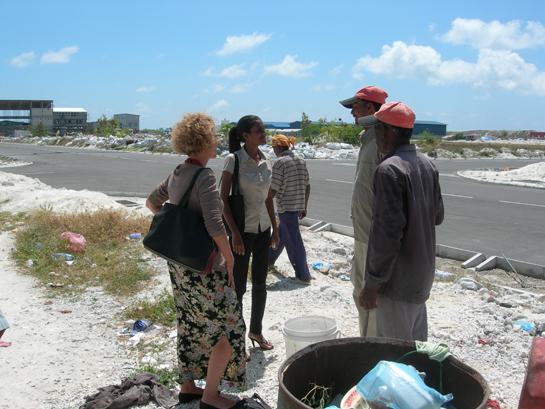(26/02/2009) At the end of her official visit to Maldives (18 to 25 February 2009), the United Nations Human Rights Council’s Special Rapporteur on adequate housing, Ms. Raquel Rolnik, pointed out the crucial role the international community must play to support adaptation strategies to face climate change:
“Maldives and its Atolls, because of their unique geological and topographic aspects and their fragile and delicate environmental system, are already experiencing the impacts of climate change. This can be seen, for example, in the acceleration of coastal erosion, greater frequency of storms and flooding, and the rise of the sea level, threatening this archipelago of very smalls islands”, she stated.
While such changes may pose in the future a serious threat to the very ability of the 300.000 people of Maldives to have a homeland, their more immediate impact can already be seen on the enjoyment of the right to adequate housing, in a country where land is very scarce and overcrowding is an issue in many islands.
The Special Rapporteur noted that “there is an international responsibility to support adaptation strategies and this must be done urgently. In this process, the post-Tsunami reconstruction process in Maldives can be a source of precious lessons”.
During her mission, Ms. Rolnik visited the Northern Atolls and some islands that were hit by the December 2004 Tsunami. She commended the achievements of the last four years, and the immediate response from international donors and agencies, which mobilized more than U$400 million in aid after the disaster. Yet she also identified a number of concerns, such as allocation of resources by some international donors and their management by the Maldivian authorities, which was not done as efficient as it could have been. “In the new resettlement sites that I visited, I detected a lack of participation in the decision making process concerning relocation, the design of the new houses, and the infrastructure, which resulted in new structures that were not always compatible with the livelihood of the communities”. Moreover, the Tsunami may have been used by the authorities in some instances as an opportunity to relocate communities in order to achieve a “consolidation” seen as a desirable policy objective. That provoked serious conflicts within and among individuals and communities and delayed construction of the new housing units. Today, after 4 years, 3,500 people among those displaced by the Tsunami are still living in temporary shelters.
Moreover, some engineering projects have been carried out without proper environmental assessment. “Some conventional infrastructure options are not working and donated equipment has been abandoned and unused because it was inadequate or there was no local capacity building to ensure it could be used and maintained”, the Special Rapporteur said.
One side effect of the post-disaster reconstruction process was a massive increase in the price of construction materials. Growing rental prices as well as increased migration to the capital – Male – has also increased pressure on housing affordability in Maldives, aggravating overcrowding and inadequate living conditions.
More than 80.000 international migrants from Bangladesh and other South Asian countries live today in Maldives, half of them working in the construction sector. The Special Rapporteur expressed particular concern in regard to their housing and living conditions.
Ms. Rolnik also expressed high hopes that civil society and non-governmental organizations will be more present and active in the newly established political environment of Maldives: “Both the State and international organizations should encourage, promote and support capacity building, raising awareness and providing information at the local level to enhance public participation in decision-making processes that must be carried out in full transparency.”
She concluded that “there is a need to deepen studies and develop innovative local solutions, based on a human rights based approach, to the very particular situation of Maldives.”
 Photo: official visit to Maldives
Photo: official visit to Maldives
ENDS
Ms. Raquel Rolnik was appointed as “Special Rapporteur on adequate housing as a component of the right to an adequate standard of living, and on the right to non-discrimination in this context”, in May 2008 by the United Nations Human Rights Council. As Special Rapporteur, she is independent from any government or organization and serves in her individual capacity. The UN first decided to appoint a Special Rapporteur to examine questions relevant to the right to adequate housing in 2000. Her mandate involves reporting annually to the Human Rights Council on the status of the realization of the right to adequate housing throughout the world, and identifying practical solutions and good practices towards this end. An architect and urban planner, Ms. Rolnik has extensive experience in the area of housing and urban policies.

Leave a Reply